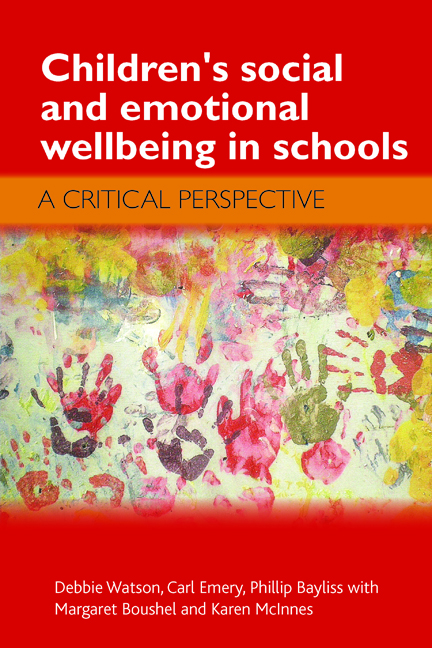Chapter 12 - The space to do something different
Published online by Cambridge University Press: 01 September 2022
Summary
Introduction
In Chapter 2, we opened up the possibility that there was a space in wellbeing research and practice with children to understand social and emotional wellbeing (SEWB) differently. Earlier chapters deconstructed traditional and meta-narratives of wellbeing, largely drawn from ‘majoritarian’ accounts in medicine and economics, and challenged their validity in capturing and describing the wellbeing of children and young people. Chapters 10 and 11 emphasised the importance of valued adult contributions to children's wellbeing experiences in terms of respecting and facilitating children's rights and challenging definitions of social and emotional support and care for children and young people in schools. Chapter 9 exemplified the importance of children exerting choice over activities and balancing enjoyable activities with subjective feelings of enjoyment and this draws on the discussion of children's voices in Chapter 7.
This chapter explores the possibilities available in social pedagogical models, and other approaches, to reframe support for children's SEWB. Such models do not rest on traditional notions of wellbeing embedded in medical or economic discourses, nor on traditional models of operationalising wellbeing in schools, but, rather, on the importance of adult–child relationships (driven from a values rather than ideological basis) (Evetts, 2008); on children being valued, respected and listened to in ways that can enable ‘genuinely alternative understandings of well-being to emerge’ (White and Petitt, 2004, p 20). Before considering specific approaches that may hold promise, we explore the theoretical bases for approaches to care and support in education that could enable us to think differently about children's SEWB.
Ethics of care as a value basis for working with children and young people
Ethics of care arose as a feminist response in the 1970s and 1980s to traditional liberal theory and critiqued the assumptions behind many ethical theories such as Kantian ethics based on moral reasoning, and Aristotelian virtue ethics. ‘Caring in these accounts refers to care for, emotional commitment to, and willingness to act on behalf of persons with whom one has a significant relationship’ (Beauchamp and Childress, 2001, p 369; original emphasisl).
- Type
- Chapter
- Information
- Children's Social and Emotional Wellbeing in SchoolsA Critical Perspective, pp. 195 - 208Publisher: Bristol University PressPrint publication year: 2012



